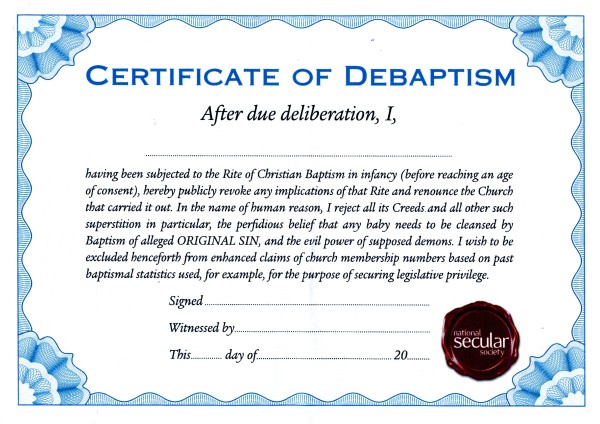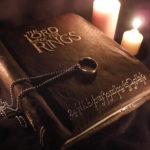The Folly of De-Baptism
by Bishop Robert Barron
Filed under Religion
Following the successful campaign in England to mount placards on buses saying “there's probably no God, now stop worrying and enjoy your life”, the land that gave us Thomas a Becket, Edward the Confessor, Anselm of Canterbury, Thomas More and John Henry Newman is now producing hundreds of thousands of people who are endeavoring to renounce their Christian identities by de-baptizing themselves.
A group called the National Secular Society is encouraging people to buy a parchment (which the NSS sells for a reasonable five dollars) announcing that they have formally abandoned their Christian faith. Others of a more aggressive spirit are pestering churches to remove their names from the baptismal registers. One ex-Christian named John Hunt insisted that he was entirely too young to make any decision for himself when he was forcibly baptized by his parents, and a certain Michael Evans has explained that baptism is a form of child abuse.
Well, I hate to break it to these good folks, but they are attempting the impossible. Try as you might, receive as many notarized documents as you can, huff and puff all you want, once you’re baptized, you can’t be unbaptized.
A valid Christian baptism effects something in the baptized person so profound that it obtains at the most fundamental level of his being. This is why in the older books of theology, baptism was described as a “character” sacrament; this meant that it branded the person in a spiritually indelible manner. Baptism is not the joining of a club; it is the act by which one is grafted onto the mystical body of Jesus Christ, becoming a cell or an organ within that living spiritual organism. And because it reaches so deep into the heart, because it involves a re-configuration of the self, baptism just can’t be undone.
I was about to say that unbaptizing oneself is as impossible as renouncing one’s nationality or changing one’s eye-color, but then I realized that both of those can, of course, be accomplished. The staying power of baptism is greater even than that of those densely textured social and physical states of affairs.
Another of the character sacraments is holy orders: once you’re a priest, you’re always a priest. You can cease to function as a priest; you can even be formally laicized by the church, you can renounce your priesthood, but you’re still a priest, like it or not.
While on retreat just in advance of my ordination, I heard a talk that gave an interesting twist to this traditional teaching. The retreat master reminded my classmates and me that, after ordination, even if we married, we’d be married priests, even if we left the active ministry, we’d be ex-priests. Our priesthood, he explained, would be part of our ontology, the structure of our being.
I fully realize how strange and counter-intuitive this all sounds. Perhaps the greatest value of modernity (and we are all moderns) is autonomy, self-direction, freedom of choice. We feel it is our sovereign right to determine our identity, to pursue happiness as we see fit. In accordance with this basic freedom, we can choose to join certain organizations, political parties, or social clubs, provided that they conform to our expectations. The moment they don’t, we feel utterly entitled to abandon them and try something else.
Now as far as it goes, this is a valid intuition, for there is indeed a legitimate arena in which self-determination holds sway. But problems arise when we attempt to transfer this to our relationship with God. In regard to spiritual matters, the prior choice always belongs to God.
Jesus told his disciples (in a line that always takes my breath away): “It was not you who chose me, but I who chose you" (John 15:16). Everyone, Catholics and atheists alike, exist and breathe and live and think because our existence, our breath, our life, and our mental capacity have been willed into being by the power of God. Whatever we choose to do with those powers is predicated upon the prior and greater choice of God to gift us with them.
The upshot of this is summed up by the spiritual writer Richard Rohr: “Your life is not about you.” It’s indeed your life, but your life has been given by another and exists, finally, for his purpose. Paul tells the Ephesians: “There is a power already at work in you that can do infinitely more than you can ask or imagine" (Eph 3:20). The thrill of the spiritual life is to surrender to that power which will, necessarily, “take us where we don’t want to go" (John 21:18).
The church’s understanding of baptism is situated in this context. Christians don’t choose to be grafted onto Christ; rather, Christ grafts us onto him so that he can use us for his purposes. This choice of his cannot be undone by any choice of ours.
Related Posts
Note: Our goal is to cultivate serious and respectful dialogue. While it's OK to disagree—even encouraged!—any snarky, offensive, or off-topic comments will be deleted. Before commenting please read the Commenting Rules and Tips. If you're having trouble commenting, read the Commenting Instructions.













